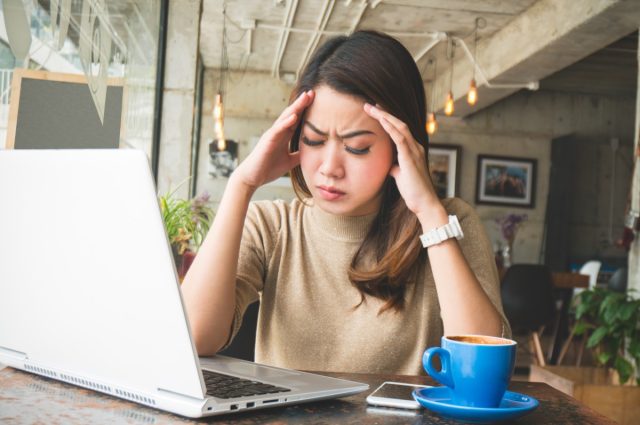Sneaky Signs You're Overstressed And What To Do About It, Expert Says

There are times in life when every aspect seems to be one huge ball of stress. After all, when it rains, it usually pours. But how much is too much when it comes to stress? According to Mayo Clinic, stress is not something to take lightly. It can be a major cause of chronic health conditions, including heart disease, diabetes, high blood pressure, and obesity. We spoke with Kristin Wilson MA, LPC, CCTP, RYT, Chief Experience Officer, Newport Healthcare to find out what to look for and how to address stress head-on. Read on to learn more about the telltale signs you're overstressed, and next check out The 6 Best Exercises for Strong and Toned Arms in 2022, Trainer Says.
These are the red flags to look out for

A little amount of stress, at times, can actually motivate you to get things done. Wilson explains, "Stress is a common feeling in daily life, especially when circumstances arise that impact your typical routine. That said, when stress starts to become overwhelming and prolonged, it can have a negative impact on your mental and physical health." She advises, "It's important to recognize when that stress you're feeling is something more than what is typical and to know what to do to alleviate it."
Your body will give off many red flags that will let you know when it's stressed. For instance, you may be feeling tired more frequently. Or, you may experience stomachaches or chest pain. Another stress indicator is when you're procrastinating or neglecting responsibilities. Are you persistently moody or filled with negative thoughts? These are also telltale signs you're overstressed. Wilson adds that withdrawing from friends and family, having trouble sleeping—or even over-sleeping, and having difficulty with remembering, focusing, and concentrating are all indicative of being stressed.
And that's not all. If you find you are turning to alcohol, drugs, or other substances as a way to self-medicate, or you've developed unexplained physical symptoms, including tics, it's likely you are overstressed.
Related: Signs A Loved One May Be Struggling With Their Mental Health
Know when to seek the help of a professional

If any or all of the above sounds descriptive of you as of late, it's time to give yourself immediate attention and self-care. Never hesitate to seek the advice of a medical professional. Wilson cautions, "If this feeling of stress continues to impact your mental and physical well-being, you should seek out professional mental health help." She also recommends, "When this feeling first comes on, you can try to practice deep breathing, take a step back or a break from your current activity, or talk to a trusted family member or friend."
There are some daily habits that can help you lower your stress level

There are also solid daily habits you can adapt for an overall less stressful life. Wilson recommends some ways to help lower your stress levels, which include engaging in physical exercise. Easy things such as a simple walk, eating healthy meals, being sure to get enough good sleep, connecting with friends and family, and spending time doing hobbies that give you joy are all positive stress reducers, too.
Wilson tells us, "Taking small steps to minimize stress in your life can make a big impact on your overall well-being and mental health." So be aware of these telltale signs you're overstressed, and incorporate some positive habits into your daily routine.
Related: 5 Easy Ways To Burn Fat Without "Exercising," Trainer Says
For more…

For more mind and body news, check out The Best Spring Wellness Trips To Book For Relaxation And Adventure and The 20 Most Inspirational Adele Lyrics That Are Major Motivation.








